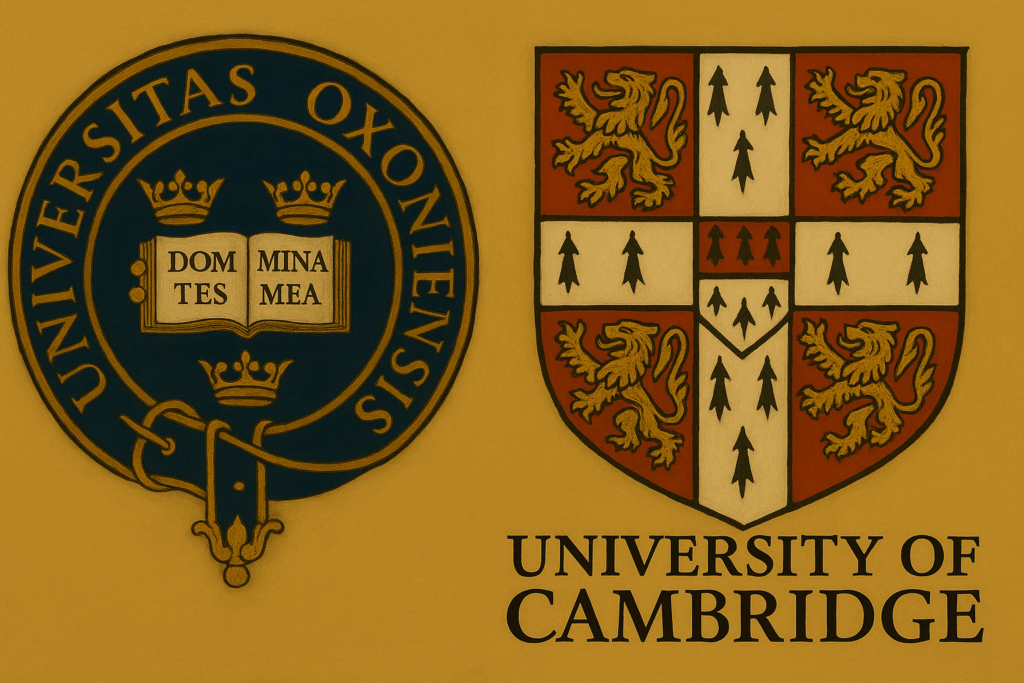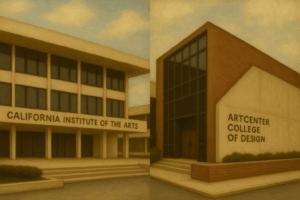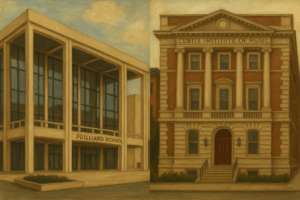
The GOAT of UK Universities?
When discussing the landscape of global higher education, the University of Oxford and the University of Cambridge, collectively known as ‘Oxbridge,’ symbolize academic excellence and historical depth. For centuries, they have served as repositories of knowledge and cradles of innovation, contributing immensely to human progress by producing numerous Nobel laureates and world leaders.
While many perceive the two institutions as competitors pursuing similar goals, this is merely a surface-level observation. If Oxford, with its profound humanistic traditions, is the ‘brain of the nation’ that cultivates leaders, then Cambridge, built on the legacy of scientific revolution, is closer to a ‘cradle of intellect’ that expands the boundaries of human knowledge.
This article moves beyond the simplistic question of “Which university is better?” to embark on a journey to answer a more fundamental question: “Which environment and culture will unlock my potential?”
1. A Look at the Numbers: 2025 Latest University Rankings
The reputations of both universities are proven by their top-tier rankings across all major global evaluation bodies.
| Ranking Body | University of Oxford (World Rank) | University of Cambridge (World Rank) |
|---|---|---|
| QS World University Rankings | 3 | 5 |
| THE World University Rankings | 1 | 5 |
| CWUR World University Rankings | 5 | 4 |
| US News Best Global Universities | 4 | 6 |
2. Academic Strengths: Oxford for Humanities vs. Cambridge for Sciences
Although both universities share similar educational systems, the fields in which they lead the world show distinct differences.
Oxford: The Uncontested Powerhouse in Medicine and Humanities
Oxford demonstrates outstanding capabilities across a broad range of disciplines, showing its strongest side particularly in the humanities, social sciences, and medicine.
- World No. 1 Fields (QS): English Language and Literature, Anatomy & Physiology, Geography
- Medicine and Health: World No. 1 for 14 consecutive years (THE)
- Computer Science: World No. 1 for 7 consecutive years (THE)
- 2025 Key Research:
- Won the Breakthrough Prize in Fundamental Physics through the ATLAS collaboration at CERN.
- Leading a consortium for AI-driven drug discovery and discovered new therapeutic targets for leukemia.
- Established the ‘Oxford EARTH’ initiative for sustainable resource research.
Cambridge: The Innovation Hub of Science and Engineering
Cambridge has inherited a tradition of scientific inquiry since Newton, pursuing original intellectual development, especially in pure sciences, engineering, and mathematics.
- World No. 2 Fields (QS): Arts and Humanities, Engineering and Technology
- Nobel Prizes: 125 university affiliates have been awarded the Nobel Prize since 1904.
- UK Ranking: Ranked 1st overall in the UK by the Complete University Guide 2025.
- 2025 Key Research:
- Developed a new treatment for high blood pressure and an implant to repair brain pathways for Parkinson’s disease.
- Achieved groundbreaking results in life sciences, including mapping the brain’s appetite control center for treating obesity and diabetes.
3. Culture and Tradition: The Power of the College System and Tutorials
The core of both universities’ culture lies in their centuries-old College system and Tutorial method of teaching. Students live in their respective colleges, fostering a strong sense of community, and meet with professors one-on-one or in small groups for in-depth discussions to cultivate critical thinking.
The Culture of Oxford
Oxford’s educational philosophy is based on ‘academic freedom’ and the ‘pursuit of truth.’ Through its small-group tutorial system, it seeks deep scholarly inquiry and excels in nurturing leaders in various societal sectors like politics and law.
- Key Traditions: Matriculation, May Morning, Eights Week (rowing), Formal Hall, Sub Fusc (official dress), Punting.
The Culture of Cambridge
Cambridge’s educational philosophy emphasizes ‘academic independence’ and the ‘application of knowledge.’ In a free academic atmosphere that encourages scientific inquiry and innovation, it focuses on cultivating original intellects who lead in the basic sciences.
- Key Traditions: Formal Dinner, ‘Stash’ (college apparel), ‘Plodge’ and ‘Pidge’ (unique slang), the tradition of only Fellows walking on the lawn.
4. Alumni Who Changed the World: 10 Giants from Each University
University of Oxford: Leaders and Thinkers Who Guided Eras
| Field | Figure | Achievement |
|---|---|---|
| Politics | Margaret Thatcher | First female Prime Minister of the UK, revolutionized British society and economy with ‘Thatcherism.’ |
| Politics | Bill Clinton | 42nd President of the United States, promoted economic growth and social reform. |
| Politics | Rishi Sunak | Current Prime Minister of the UK, significant influence on UK economic policy. |
| Politics | Boris Johnson | Former Prime Minister of the UK, led Brexit. |
| Politics | William Gladstone | 19th-century British Prime Minister, pursued financial and educational reforms. |
| Philosophy | John Locke | Laid the foundations for the Enlightenment and modern democratic and liberal thought. |
| Economics | Adam Smith | Author of The Wealth of Nations, the father of modern economics. |
| Science | Stephen Hawking (BA) | Made groundbreaking contributions to the world of science with research on black holes and the origin of the universe. |
| Literature | J.R.R. Tolkien | Author of The Lord of the Rings, the father of modern fantasy literature. |
| Literature | Oscar Wilde | A leading figure of the 19th-century Aesthetic movement. |
University of Cambridge: Pioneers of Scientific Revolution and Trailblazers
| Field | Figure | Achievement |
|---|---|---|
| Science | Isaac Newton | Established the foundations of classical mechanics with the laws of motion and universal gravitation. |
| Science | Charles Darwin | Author of On the Origin of Species, which introduced the theory of evolution. |
| Science | Francis Crick & James Watson | Revolutionized biology by discovering the double helix structure of DNA. |
| Science | Stephen Hawking (PhD) | Made groundbreaking contributions to the world of science with research on black holes and the origin of the universe. |
| Computer Science | Alan Turing | The father of modern computer science, proposed the Turing machine concept and decoded the Enigma cipher. |
| Economics | John Maynard Keynes | Founder of Keynesian economics, making significant contributions to macroeconomics. |
| Philosophy | Bertrand Russell | A pioneer of analytic philosophy and a Nobel laureate in Literature. |
| Politics | Manmohan Singh | Served as Prime Minister of India, leading the country’s economic liberalization. |
| Literature | Zadie Smith | A novelist known for her sharp insights into the multicultural realities of contemporary society. |
Conclusion: A Harmony of Tradition and Innovation, What’s Your Choice?
While Oxford and Cambridge share world-class reputations, they show distinct differences in their academic culture and areas of focus.
- Oxford: The ‘Nation’s Brain’ that Leads Society
Based on its profound history and humanistic depth, it emphasizes critical thinking and broad liberal arts education, excelling in nurturing leaders in fields like politics, law, and the humanities. - Cambridge: The ‘Cradle of Intellect’ that Expands the Boundaries of Knowledge
Inheriting the tradition of scientific inquiry since Newton, it pursues original intellectual development in pure sciences, engineering, and mathematics under a ‘free academic spirit,’ excelling in making groundbreaking discoveries that lead the world.
If Oxford focuses on producing leaders who drive social change, Cambridge contributes by expanding the horizons of human knowledge through scientific discovery and technological innovation. Their complementary development plays a crucial role in establishing the UK as a global hub for education and innovation, and they will continue to contribute to the advancement of human society in their own unique ways.


